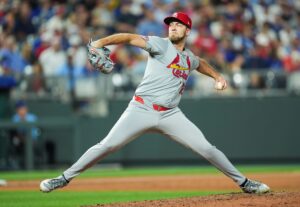Tomorrow, Congress will attempt to pass into law one of Major League Baseball’s cruelest traditions. On Friday, legislators will vote on a spending bill that includes a section which would, if passed, codify the league’s underpayment of its minor league players. The “Save America’s Pastime Act”, as it somehow gets away with being called, would exempt minor league baseball players from the Fair Labor Standards Act of 1938, legalizing and legitimizing MLB’s practice of paying the vast majority of its employees far below minimum wage.
The continued underpayment of minor league baseball players is nearly law. On Page 1,967 of the new omnibus bill is an amendment that exempts minor league players from federal labor law. If Congress passes the bill by Friday, it’s official. The language: https://t.co/oNXzB8iud4 pic.twitter.com/102mGFD3Mj
— Jeff Passan (@JeffPassan) March 22, 2018
The Act’s passage would, unfortunately, only continue Congress’ recent trend of holding down the poor to prop up the wealthy. Perhaps the most disgusting part is the blatant lie in it’s justification.
The “Save America’s Pastime Act” is in the omnibus. As you should be able to infer from the title, it is about screwing over underpaid minor league baseball players
— Jim Newell (@jim_newell) March 22, 2018
The Save America’s Pastime Act will Crush Those who Play America’s Pastime
Calling it the “Save America’s Pastime Act” is disingenuous at best. If we’re being honest, calling it so demonstrates that Congress and Commissioner Manfred assume we’re stupid, that we’re not paying attention, and that we’re perfectly willing to believe that paying minor leaguers a livable wage would bring about the downfall of the institution of baseball. A ludicrous notion on it’s face, the idea passes neither the smell test nor the test of a 30-second Google search.
What, exactly, does MLB need saving from? A popular myth that baseball is a dying sport has pervaded the digital halls of the internet for years. In most instances, the commissioner and the league office are among the first to hit back against that myth. Only when it concerns their bottom line do they fall into step with the fear-mongers.
Debunking a Myth
Here are the facts. Over the past decade-and-a-half, Major League Baseball has seen attendance and viewership rise to record levels. Add that to ridiculously lucrative TV deals and increased ticket prices, and as a natural result team profits have never been higher. What’s more, each team made about $50 million from last year’s sale of BAMTech. Those same major league teams pay the minor league players’ salaries.
If we go beyond the professional level, we see participation in youth baseball on the rise. In 2016, youth baseball and softball had nearly 25 million combined participants. That beat every other team sport. Rob Manfred’s Play Ball initiative is, in short, working.
An Exploited Workforce
Baseball is not dying, it’s thriving, and paying minor leaguers a livable wage would barely make a dent in the owners’ profit margins. Right now, minor league players, on average, earn $4.63 per hour. While top prospects sometimes sign million-dollar deals coming out of the draft, most minor leaguers make just over $1,000 per month. At the Triple-A level, players can make as little as $2,150 per month. For comparison’s sake, it’s worth noting that major league players earn a minimum of $2,800 per day.
Here’s the real kicker: that salary, paltry as it already seems, is only paid to minor league players during the season, which can be as short as three months. During the offseason, they’re left to fend for themselves and find whatever work they can. Stories of minor leaguers who can barely afford rent or food, who don’t know how they’ll pay their bills, who are living out of vans, or living on food stamps are a dime a dozen, as MLB clearly believes the players themselves should be. In the Washington Post’s 2016 story on this very subject, players recounted how they would sleep in the luggage bins of team buses, how a jar of peanut butter was considered a good meal, and how they all knew the stadium employees made more than they did.
The Truth
The league could address this without batting an eye. Major league teams could easily afford to pay their farmhands a living wage. Per CNN Money, paying MiLB players an extra $10 per hour for a 60-hour work week would cost each franchise less than $3 million a year. That’s pocket change for some of the wealthiest organizations in professional sports.
If anything kills baseball, it’ll be greed. Youth participation, though on the rise, won’t translate into growth in the minor league ranks if players can’t afford to live and play. Why does that matter? Minor league games are affordable, plentiful, and easy to get to. They’re excellent for exposing kids and adults who aren’t yet fans to the game. MLB needs the minors for its reach to be as extensive as it is.
The vast majority of minor league players won’t ever step onto a major league field, and at some point the dream stops being worth the risk. Most players have families they have to somehow provide for. If they can’t do that and play baseball at the same time, they’ll make a choice. Major League Baseball, as an employer, isn’t looking out for its employees; the government not only refuses to step in, but now looks to aid the league in exploiting its labor force. If anything kills baseball, it’ll be greed, and the league will have gotten exactly what it deserves.
Main Photo:






